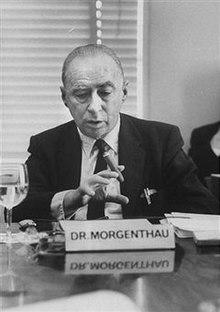
Back هانز مورغنثاو Arabic هانز مورجنثاو ARZ Hans Morgenthau AST Hans Morgentau Azerbaijani هانس مورقنتا AZB Hans Morgenthau Catalan Hans Morgenthau Czech Hans Morgenthau Welsh Hans Morgenthau Danish Hans Joachim Morgenthau German
Hans Morgenthau | |
|---|---|
 Morgenthau in 1963 | |
| Born | Hans Joachim Morgenthau February 17, 1904 |
| Died | July 19, 1980 (aged 76) New York City, U.S. |
| Nationality | German, American |
| Known for | Classical realism |
| Notable work | Politics Among Nations |
Hans Joachim Morgenthau (February 17, 1904 – July 19, 1980) was a German-American jurist and political scientist who was one of the major 20th-century figures in the study of international relations. Morgenthau's works belong to the tradition of realism in international relations theory; he is usually considered among the most influential realists of the post-World War II period.[1] Morgenthau made landmark contributions to international relations theory and the study of international law. His Politics Among Nations, first published in 1948, went through five editions during his lifetime and was widely adopted as a textbook in U.S. universities. While Morgenthau emphasized the centrality of power and "the national interest," the subtitle of Politics Among Nations—"the struggle for power and peace"—indicates his concern not only with the struggle for power but also with the ways in which it is limited by ethical and legal norms.[2]
In addition to his books, Morgenthau wrote widely about international politics and U.S. foreign policy for general-circulation publications such as The New Leader, Commentary, Worldview, The New York Review of Books and The New Republic. He knew and corresponded with many of the leading intellectuals and writers of his era, such as Reinhold Niebuhr,[3] George F. Kennan,[4] Carl Schmitt[5] and Hannah Arendt.[6][7] At one point in the early Cold War, Morgenthau was a consultant to the U.S. Department of State when Kennan headed its Policy Planning Staff, as well as a second time during the Kennedy and Johnson administrations until he was dismissed by Johnson when he began to publicly criticize American policy in Vietnam.[8] For most of his career, however, Morgenthau was esteemed as an academic interpreter of U.S. foreign policy.[9]
- ^ Specter, Matthew (2022). The Atlantic Realists: Empire and International Political Thought Between Germany and the United States. Stanford University Press. ISBN 978-1-5036-0312-7.
- ^ H. Morgenthau, Politics Among Nations, 4th edition (Knopf, 1967), chapter 15.
- ^ Daniel Rice, Reinhold Niebuhr and His Circle of Influence (Cambridge Univ. Press, 2013), chapter on Hans Morgenthau.
- ^ Daniel Rice, Reinhold Niebuhr and His Circle of Influence, chapter on George Kennan.
- ^ Scheuerman, William E. (2006-09-22). "Carl Schmitt and Hans Morgenthau: Realism and Beyond".
- ^ Douglas Klusmeyer, "Beyond Tragedy: Hannah Arendt and Hans Morgenthau on Responsibility, Evil and Political Ethics," International Studies Review 11, number 2 (2009): pages 332–351.
- ^ Rösch, Felix (2013-11-01). "Realism as social criticism: The thinking partnership of Hannah Arendt and Hans Morgenthau" (PDF). International Politics. 50 (6): 815–829. doi:10.1057/ip.2013.32. ISSN 1384-5748. S2CID 143185901.
- ^ Zambernardi, L. (2011). "The Impotence of Power: Morgenthau's Critique of American Intervention in Vietnam". Review of International Studies. 37 (3): 1335–1356. doi:10.1017/S0260210510001531. S2CID 145583770.
- ^ See e.g. Hans Morgenthau, In Defense of the National Interest: A Critical Examination of American Foreign Policy, with a new introduction by Kenneth W. Thompson (Washington, D.C.: University Press of America, 1982).
© MMXXIII Rich X Search. We shall prevail. All rights reserved. Rich X Search